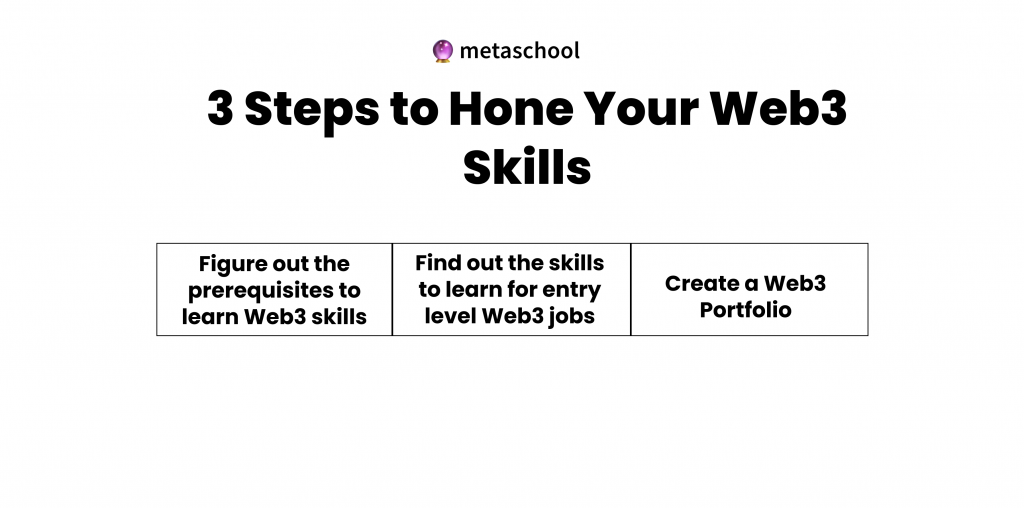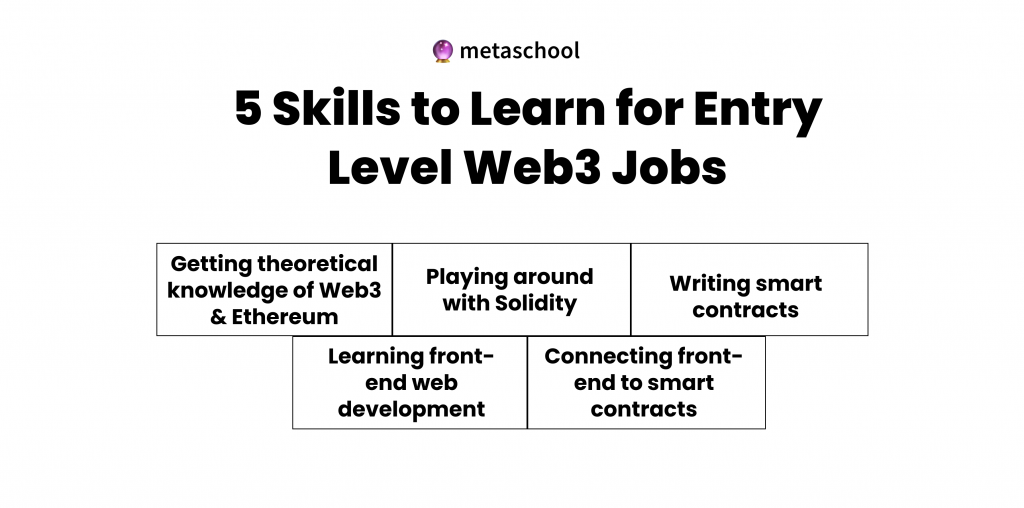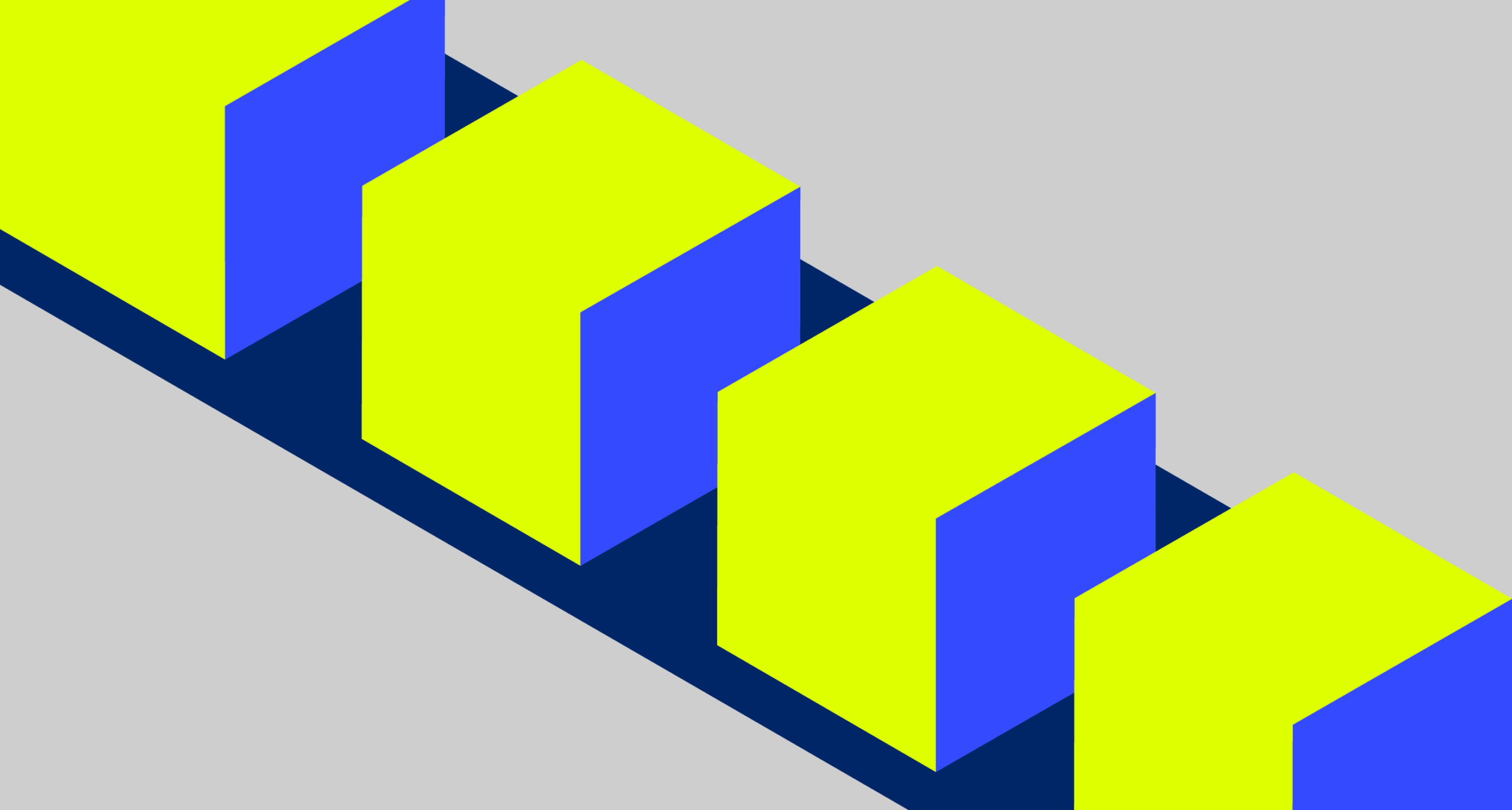Table of Contents
Web3 is all the rage nowadays. That’s probably the reason why you’re here. I don’t blame you because massive amount of money is flowing into the space, with web3 companies getting millions in funding as they prepare to change the internet drastically.
In order for these changes to happen, we need driven and curious web3 developers – who are short in supply – pushing even entry level web3 jobs to pay out a minimum of $60k/annum to candidates.
That’s only entry level. 😉
So if you’re on the internet finding web3 jobs and what they require, you’re luckily in the right place. On that note, there are several skills that go into preparing you for web3 jobs and depending on what your existing skill level is, can take from 2-6 months to learn and develop.
☀️Explore this: Create an ERC-20 Token in Solidity on Avalanche

Step 1: Figure out prerequisites to learn web3 skills
For people who don’t have a background in web2 programming languages like JavaScript and also no experience in web development generally, you might want to wait. I’d encourage you to start learning those first because they form the foundation for what you will learn in web3.
There are way too many amazing web2 resources (completely free) on the internet that can help you navigate what to learn, how to learn and how much time it will take to learn the skills. I’m linking to a good resource here if you’d like to check it out.
If you have fairly decent experience in the above mentioned, congratulations, you can move forward. This is because having web development skills will help you transition more easily into the web3 tech stack.
Step 2: Skills to learn for entry level web3 jobs
The skills that I’m about to mention are the bare-minimum you need in order to understand the web3 landscape. Moreover, you will need to spend some time building a portfolio by doing some gigs (if you get lucky then paid ones) and doing a lot of building on your end.
This could be a big learning curve for some. Many say that in order to understand web3, you have to unlearn web2. But if you’re in it to win it, it shouldn’t be so hard. I commend your enthusiasm and willingness to learn these skills and give a try to securing a web3 job.
This is an ideal web3 skills checklist. Start covering these, one by one.
1. Brush up on Blockchain basics & Ethereum
The very first thing you should be learning about is the blockchain and also potentially what kinds of blockchains you can work with. Decentralization is at the core of blockchain and very much unlike how the internet works today. I’ve written the easiest to understand guide and I’m linking it. It’ll help you understand what blockchain is, what its purpose is and how it works.
📌 Bookmark this: Ultimate 2023 Guide to Blockchain
Moreover, Ethereum helps you create or write smart contracts in Solidity or even various other languages. It is by far the most popular one at the moment and a lot of web3 jobs include the Solidity developer role title. In fact, they’re usually the most in demand.
I have an amazing course for you to study. It breaks down the Ethereum blockchain perfectly. Not to forget it’s completely free.
2. Learn Solidity
Solidity is a web3 programming language, and as mentioned, is native to the Ethereum blockchain. It helps to write and develop smart contracts, which basically makes code self-executing and reduces the need for human intervention in various use-cases.
If you want an entry level web3 job, chances are, you’ll most definitely need to know your way around Solidity. Here is the list of courses that allow you to build in Solidity and deploy on different blockchains.
The content for the Solidity-specific courses has been engineered in the best way possible, to help absolute beginners pick up on concepts with real-world examples🎉
Moreover, also read a little more about how the Ethereum chain is overloaded, how gas fee works, how every line of code you write matters and can affect the expenses of a contract, and how you can optimize that code.
This will be an important part of entry interviews because proper and consistent optimizations can save companies millions of dollars each year for a heavily used app or contract. So they’d rather spend on someone who can cut that cost for them and make the process efficient.
3. Write smart contracts
Once you’re well-versed in blockchain, especially Ethereum and Solidity concepts – the next step for you to do is write a smart contract. A smart contract is code which is deployed to the blockchain in a programming language like Solidity which blockchain nodes can execute.

You better learn how to do this because it will be one of the first things entry level web3 jobs for smart contract development or blockchain development will require you to do.
✅Popular course: Create a Fungible Token with Sui Move
4. Learn front-end web development
It’s essential you know basics of front-end web development because while your decentralized application or dApp backend may be enabled with blockchain, the front-end is mostly JavaScript.
Some things you’d need to pick along the way:
- HTML — Common HTML tags
- CSS — Basic Properties, Flex, Grid
- CSS Frameworks — Bootstrap, Semantic UI, Tailwind etc
- JavaScript — Variables, Functions, Classes, ES6 etc.
- JavaScript Frameworks — React/Vue/Angular
I’ve linked to CodeAcademy above in the prerequisites section. You will find resources to learn these there.
5. Connect your front-end to smart contracts
Once you’re done writing your smart contract and you know front-end web development too, you’ll have to integrate the two and interface them. Libraries will help you implement the Ethereum API. In order to do this, you will need to learn about libraries like:
- ether.js
- Web3.js
It’s not necessary to know how to work with both. Just pick one and master it.
Step 3: Create a portfolio
When you’ve been able to pick up theoretical as well as practical knowledge, you will need to start building a portfolio. This portfolio must consist of several components that help recruiters tick mark a lot of the boxes that are required for entry level web3 jobs.
This is perhaps the best way to demonstrate to recruiters that you mean business.
Skills your portfolio should demonstrate
- Front-end web development
- A web3 programming language like Solidity or Rust
- Smart contract development
- Gas optimization
- Integration and staging deployment
- Know how of deployment to the official testnet
- Design patterns
- Smart contract security
Once you have projects consisting of these on your portfolio, start applying to places. Of course you will need some experience working in professional environments so if you’re a complete beginner, try to bag some internships or volunteer somewhere. Get that time on your resume and there will be no reason left for you not to get hired.
Here are some great projects for building your web3 portfolio 👇🏼
Good luck!
That’s all for today. I hope this helped you. If you liked it, share it with friends and peers. 👋🔮
